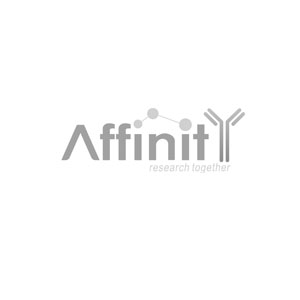GRK6 Antibody - #DF3180
| Product: | GRK6 Antibody |
| Catalog: | DF3180 |
| Description: | Rabbit polyclonal antibody to GRK6 |
| Application: | WB IHC IF/ICC |
| Reactivity: | Human, Mouse, Rat |
| Prediction: | Pig, Zebrafish, Bovine, Horse, Sheep, Rabbit, Chicken, Xenopus |
| Mol.Wt.: | 65 KD; 66kD(Calculated). |
| Uniprot: | P43250 |
| RRID: | AB_2835403 |
Related Downloads
Protocols
Product Info
*The optimal dilutions should be determined by the end user.
*Tips:
WB: For western blot detection of denatured protein samples. IHC: For immunohistochemical detection of paraffin sections (IHC-p) or frozen sections (IHC-f) of tissue samples. IF/ICC: For immunofluorescence detection of cell samples. ELISA(peptide): For ELISA detection of antigenic peptide.
Cite Format: Affinity Biosciences Cat# DF3180, RRID:AB_2835403.
Fold/Unfold
FLJ32135; G protein coupled receptor kinase 6; G protein coupled receptor kinase GRK6; G protein-coupled receptor kinase 6; G protein-coupled receptor kinase GRK6; Gprk6; Grk6; GRK6_HUMAN;
Immunogens
- P43250 GRK6_HUMAN:
- Protein BLAST With
- NCBI/
- ExPASy/
- Uniprot
MELENIVANTVLLKAREGGGGNRKGKSKKWRQMLQFPHISQCEELRLSLERDYHSLCERQPIGRLLFREFCATRPELSRCVAFLDGVAEYEVTPDDKRKACGRQLTQNFLSHTGPDLIPEVPRQLVTNCTQRLEQGPCKDLFQELTRLTHEYLSVAPFADYLDSIYFNRFLQWKWLERQPVTKNTFRQYRVLGKGGFGEVCACQVRATGKMYACKKLEKKRIKKRKGEAMALNEKQILEKVNSRFVVSLAYAYETKDALCLVLTLMNGGDLKFHIYHMGQAGFPEARAVFYAAEICCGLEDLHRERIVYRDLKPENILLDDHGHIRISDLGLAVHVPEGQTIKGRVGTVGYMAPEVVKNERYTFSPDWWALGCLLYEMIAGQSPFQQRKKKIKREEVERLVKEVPEEYSERFSPQARSLCSQLLCKDPAERLGCRGGSAREVKEHPLFKKLNFKRLGAGMLEPPFKPDPQAIYCKDVLDIEQFSTVKGVELEPTDQDFYQKFATGSVPIPWQNEMVETECFQELNVFGLDGSVPPDLDWKGQPPAPPKKGLLQRLFSRQDCCGNCSDSEEELPTRL
Predictions
Score>80(red) has high confidence and is suggested to be used for WB detection. *The prediction model is mainly based on the alignment of immunogen sequences, the results are for reference only, not as the basis of quality assurance.
High(score>80) Medium(80>score>50) Low(score<50) No confidence
PTMs - P43250 As Substrate
| Site | PTM Type | Enzyme | Source |
|---|---|---|---|
| T10 | Phosphorylation | Uniprot | |
| K14 | Ubiquitination | Uniprot | |
| T106 | Phosphorylation | Uniprot | |
| S111 | Phosphorylation | Uniprot | |
| T113 | Phosphorylation | Uniprot | |
| K139 | Ubiquitination | Uniprot | |
| K183 | Ubiquitination | Uniprot | |
| K194 | Ubiquitination | Uniprot | |
| K210 | Ubiquitination | Uniprot | |
| K226 | Ubiquitination | Uniprot | |
| K235 | Acetylation | Uniprot | |
| K235 | Ubiquitination | Uniprot | |
| K240 | Acetylation | Uniprot | |
| K240 | Ubiquitination | Uniprot | |
| K313 | Ubiquitination | Uniprot | |
| K343 | Ubiquitination | Uniprot | |
| K358 | Ubiquitination | Uniprot | |
| K402 | Ubiquitination | Uniprot | |
| K426 | Ubiquitination | Uniprot | |
| K443 | Ubiquitination | Uniprot | |
| K466 | Ubiquitination | Uniprot | |
| S484 | Phosphorylation | P43250 (GRK6) | Uniprot |
| T485 | Phosphorylation | P43250 (GRK6) | Uniprot |
| K487 | Ubiquitination | Uniprot | |
| S557 | Phosphorylation | Uniprot | |
| S566 | Phosphorylation | Uniprot | |
| S568 | Phosphorylation | Uniprot |
PTMs - P43250 As Enzyme
| Substrate | Site | Source |
|---|---|---|
| O14745 (SLC9A3R1) | S290 | Uniprot |
| O75581 (LRP6) | S1448 | Uniprot |
| O75581 (LRP6) | S1490 | Uniprot |
| O75581 (LRP6) | S1508 | Uniprot |
| O75581 (LRP6) | T1572 | Uniprot |
| O75581 (LRP6) | S1590 | Uniprot |
| P07550 (ADRB2) | S355 | Uniprot |
| P07550 (ADRB2) | S356 | Uniprot |
| P08069 (IGF1R) | S1321 | Uniprot |
| P25963 (NFKBIA) | S32 | Uniprot |
| P25963 (NFKBIA) | S36 | Uniprot |
| P30411-2 (BDKRB2) | S346 | Uniprot |
| P30411-2 (BDKRB2) | S348 | Uniprot |
| P30411 (BDKRB2) | S366 | Uniprot |
| P30411 (BDKRB2) | S373 | Uniprot |
| P30411-1 (BDKRB2) | S375 | Uniprot |
| P37840-1 (SNCA) | S9 | Uniprot |
| P37840 (SNCA) | S129 | Uniprot |
| P43250 (GRK6) | S484 | Uniprot |
| P43250-3 (GRK6) | T485 | Uniprot |
| P61073 (CXCR4) | S324 | Uniprot |
| P61073 (CXCR4) | S325 | Uniprot |
| P61073 (CXCR4) | S330 | Uniprot |
| P61073 (CXCR4) | S339 | Uniprot |
| Q15722 (LTB4R) | T308 | Uniprot |
Research Backgrounds
Specifically phosphorylates the activated forms of G protein-coupled receptors. Such receptor phosphorylation initiates beta-arrestin-mediated receptor desensitization, internalization, and signaling events leading to their desensitization. Seems to be involved in the desensitization of D2-like dopamine receptors in striatum and chemokine receptor CXCR4 which is critical for CXCL12-induced cell chemotaxis (By similarity). Phosphorylates rhodopsin (RHO) (in vitro) and a non G-protein-coupled receptor: LRP6 during Wnt signaling (in vitro).
It is uncertain whether palmitoylation is on Cys-561 and/or Cys-562 and/or Cys-565.
Membrane>Lipid-anchor.
Widely expressed.
Belongs to the protein kinase superfamily. AGC Ser/Thr protein kinase family. GPRK subfamily.
Research Fields
· Cellular Processes > Transport and catabolism > Endocytosis. (View pathway)
· Human Diseases > Substance dependence > Morphine addiction.
· Organismal Systems > Immune system > Chemokine signaling pathway. (View pathway)
Restrictive clause
Affinity Biosciences tests all products strictly. Citations are provided as a resource for additional applications that have not been validated by Affinity Biosciences. Please choose the appropriate format for each application and consult Materials and Methods sections for additional details about the use of any product in these publications.
For Research Use Only.
Not for use in diagnostic or therapeutic procedures. Not for resale. Not for distribution without written consent. Affinity Biosciences will not be held responsible for patent infringement or other violations that may occur with the use of our products. Affinity Biosciences, Affinity Biosciences Logo and all other trademarks are the property of Affinity Biosciences LTD.
